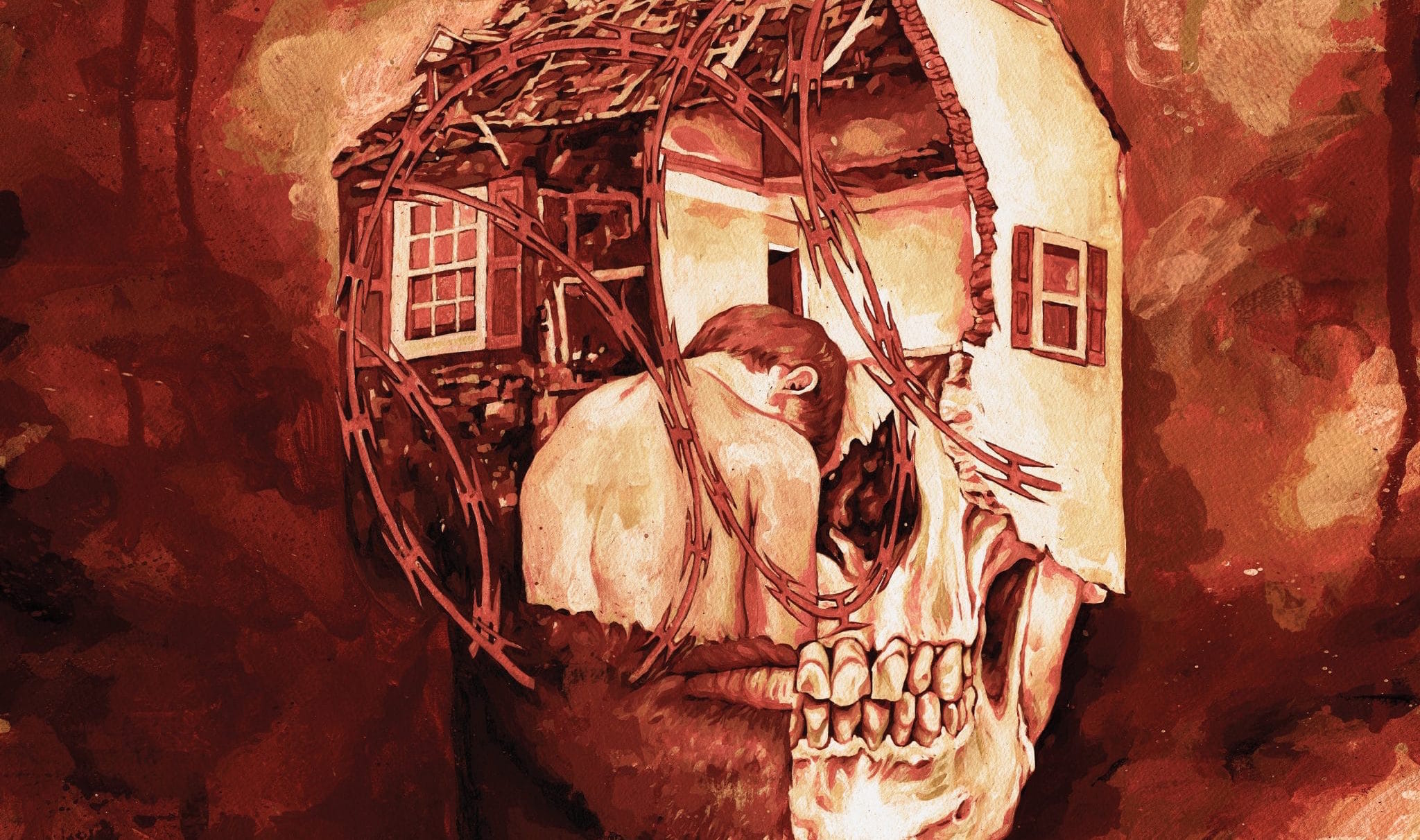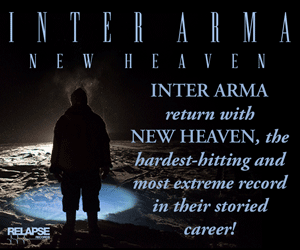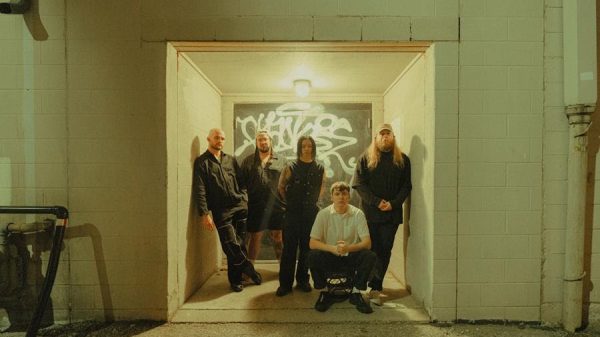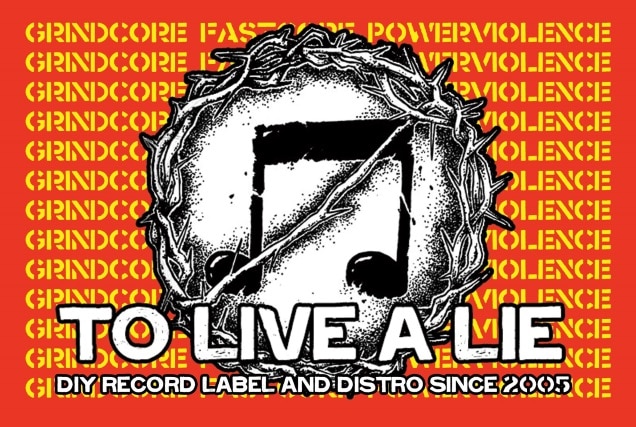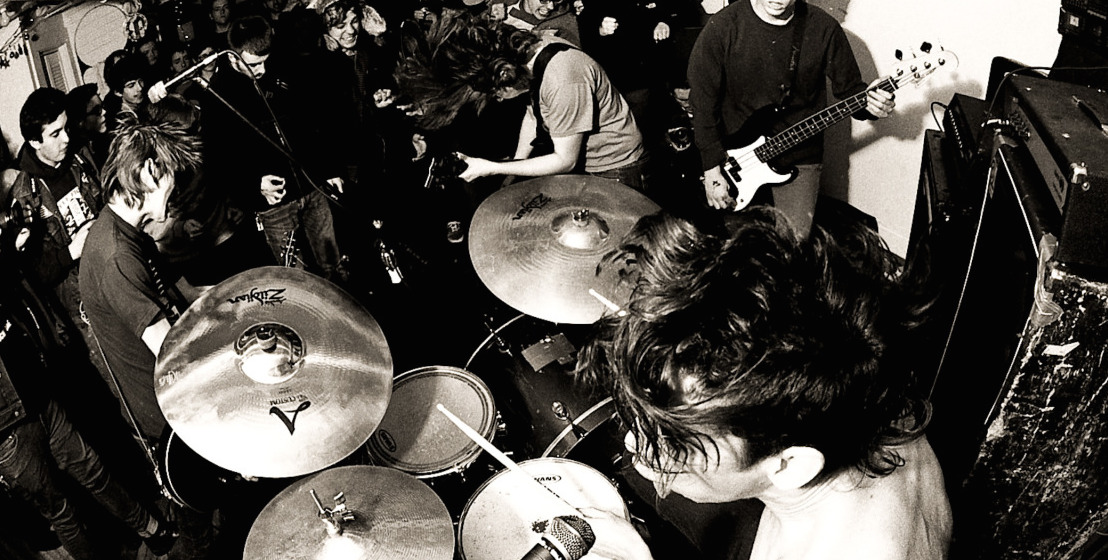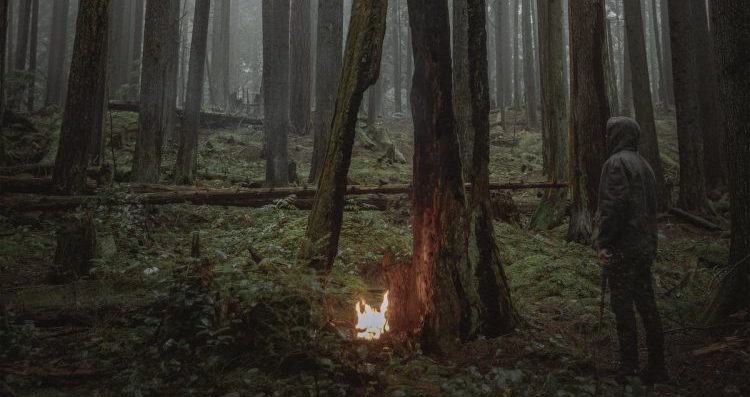The last five years have seen a renaissance in hardcore in the United States. Some alignment of the cosmos has created the circumstances for bands like Jesus Piece, Vein, Chamber, Queensway, Three Knee Deep, Trail of Lies, Judiciary, Sanction, Vamachara, Jukai, Harvest, and Candy to dominate the hardcore landscape with this New Wave of American Hardcore. One of the most vital bands in this movement is Delaware’s Year of the Knife. With only a couple EPs and 2019’s Ultimate Aggression—a collection of their recorded material released by their label, hardcore powerhouse Pure Noise Records–under their belt, they have still managed to ascend quickly by touring nearly ceaselessly with scene veterans like Terror, Knocked Loose, Backtrack, Counterparts, Stick To Your Guns, Harm’s Way, and The Acacia Strain and by playing countless festivals. These musicians put in the work, and their sweat is rightly being rewarded with international renown.
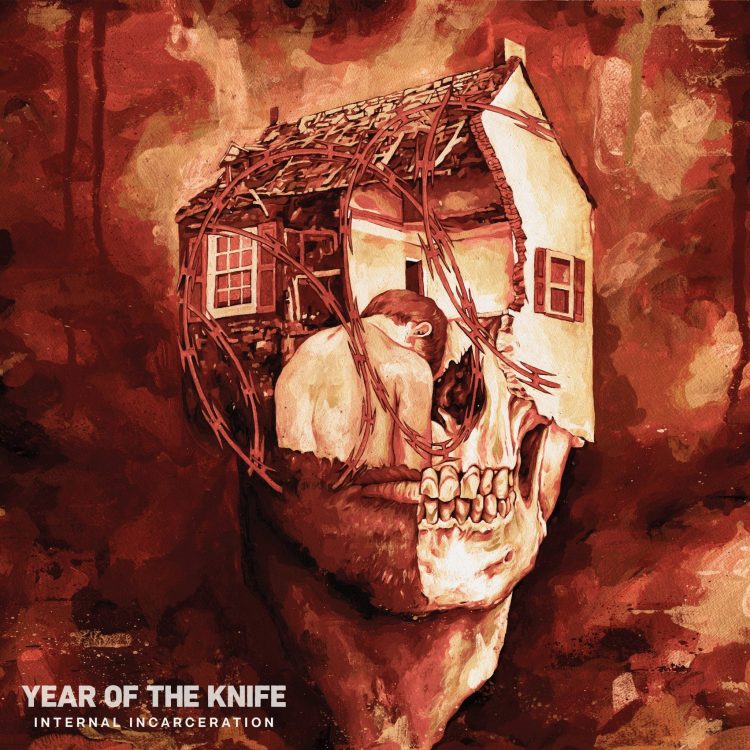
Year of the Knife’s special brand of hardcore, which walks a fine line between straight edge hardcore and classic death metal, has made them a vital voice in the current hardcore revival. As important as their music, for many fans, is their loud and direct approach to living a principled life. Issues of drug addiction, dissolving relationships, inequality, and death are timeless and universal, but they are probably more relevant than ever to fans who have been touched by the opioid epidemic and racial injustice.
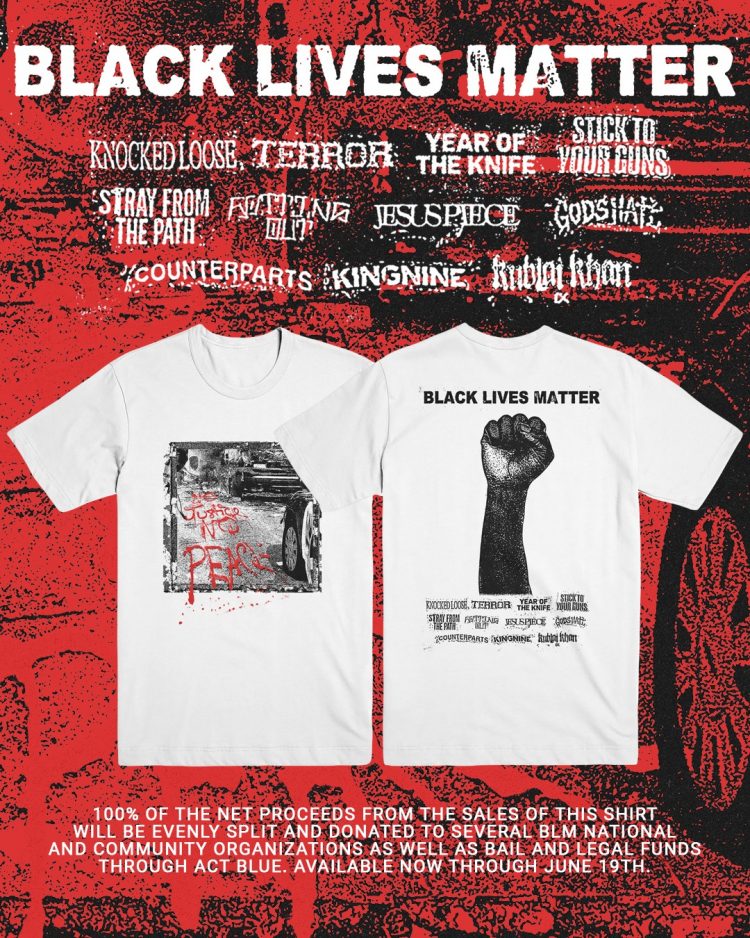
With today’s sociopolitical climate creating a sense of urgency, anger, and duty in many hardcore listeners, Year of the Knife has found the perfect time to release their highly anticipated debut album, Internal Incarceration. This album is addressing the ills of the day, and it is everything that is great about modern hardcore. This album feels like the release of repressed rage that so many have needed for the past six months. It is a purge of negativity, a balm for suffering souls, a primer on turning your personal poisons into something positive.
Internal Incarceration takes everything that has made the band so successful and cranks the knob. It’s tight-as-a-drum breakdowns will make you fight invisible ghosts in public. The HM-2-driven, dual-guitar attack by Brandon Watkins and Aaron Kisielewski locks in perfectly with the well-oiled-machine rhythm section of bassist Madison Watkins and drummer Andrew Kisielewski. Singer Tyler Mullen is a voice of the people, screaming outwardly everything society asks us to keep inside, and his palpable ire is a release. Using riffs that evoke Obituary, Sepultura, and Deicide, with galloping tremolos and rich, buzzsaw tones, Internal Incarceration integrates more death metal influence into their hardcore, and though they will have earned headlining spots on many hardcore tours and fests when venues re-open, they will appeal equally to any discerning metalheads in the crowd.
Listeners with keen ears will quickly recognize the production on Internal Incarceration. Kurt Ballou’s name and signature sound has become ubiquitous at the intersection of hardcore and metal, and his handiwork at God City Studios maximizes Year of the Knife’s strengths for this debut. As he has with Baptists, Code Orange, Nails, Gatecreeper, Trap Them, Black Breath, KEN Mode, Gaza, All Pigs Must Die, Breather Resist, American Nightmare, and countless others across the span of decades and genres, he helps Year of the Knife to realize their potential in a way that should win universal approval from crowds and critics.
Internal Incarceration is relentlessly punishing, with no weaknesses and numerous strengths. “Virtual Narcotic,” a treatise against addiction to technology, features fierce hive-of-angry-bees tremolos and a battering ram chorus, both of which are pure circle-pit fuel. “Manipulation Artist” is a Cavalera-channeling crowd anthem about the toxic relationships and finding the strength to stand up for yourself. The title track is roller coaster of rage, discussing the trauma of losing loved ones and coping with mental illness. “Sick Statistic” draws on influences like Entombed and Trapped Under Ice to speak from the perspective of an opiate addict, ostracized from family and society. “Eviction” utilizes triple vocals from Mullen and both Madison and Brandon Watkins to lament the pervasiveness of family dysfunction, especially exacerbated by addiction and class structure. As a unit, Internal Incarceration is a red-hot engine of angst and aggression.
Year of the Knife were kind enough to share some thoughts on their magnificent debut.
Ultimate Aggression was an immense success a deserved favorite among hardcore fans. In some ways, Internal Incarceration is a debut album, and in some ways it is a sophomore release, especially considering the impact of Ultimate Aggression. How did you approach songwriting for this album? Were there things you wanted to maintain? Things you wanted to try out?
Brandon: It’s crazy because we wrote some of these tracks before we put Ultimate Aggression together. We’ve been playing “DDM” since 2016, different singer, different guitar player. A lot of the older tracks Tyler and I would write an entire song and then sit on it ’til we needed to tweak it or whatever. “Nothing to Nobody” is another song we unearthed from the crypts… Then with newer tracks like “This Time,” I would write out the whole song on guitar and take it to the band. Ultimate Aggression is essentially two demos and a song that feels like a blend of both demos. With Internal Incarceration, I wanted all the newer stuff that I wrote to reflect the sounds of Ultimate Aggression but pushed to the max. I think it’s really apparent with “Virtual Narcotic” and “Manipulation Artist” being the lead singles of the album that we’re pushing a more extreme sound. This record is true testament to our sound.
Although your sound has always had a bit of a death metal influence, that background is a little more notable on Internal Incarceration? Who are some of your favorite death metal bands, past and present, and how did you integrate more of that without losing your hardcore sound?
Brandon: I tried to up the ante on everything on Internal Incarceration. Death metal has always been a big YOTK influence, but on Internal Incarceration, I really wanted that to shine through. My favorites and most influential are bands like Cannibal Corpse, Suffocation, and Morbid Angel. You can definitely hear lots of obscure shit like Broken Hope if you’re really listening. As a whole, I feel like we all really vibe on bands like Cannibal Corpse and Six Feet Under. There’s a lot of death metal in hardcore. If you listen to Master Killer, it’s almost all crazy ass tremolo parts. Listening to Satisfaction is the Death of Desire, all the hard parts are DM influenced. Death metal has always been prevalent in my favorite hardcore bands, but what we do differently is push that sound more. Listening to Slayer helps a lot.
This is your first time working with legendary producer and musician Kurt Ballou. How did working with him influence your recording process?
Brandon: Our good friend Wyatt Oblehozer did everything for Ultimate Aggression. He did the original recordings for First State Aggression, and he also did the OG recording of “Sick Statistic” that’s on the Pure Noise comp. Wyatts’ studio is known as The Knife Lair (which was its name before we started recording there lol). Working with Kurt was insane to say the least. It was the first time any of us have done anything of that level. Kurt was really great to work with. He had lots of little tweaks and ideas for the songs and made our tones into something that surpassed our (or at least my own) idea of what a hc band could sound like. The dude is a huge influence for us, and working with him was a dream.
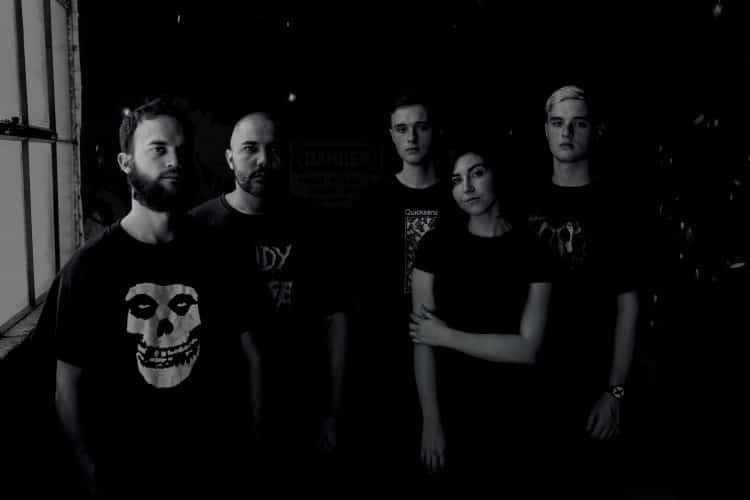
Year of the Knife has quickly become one of the loudest voices in modern straight edge, and Internal Incarceration continues to focus on abuse, addiction, and the damage, direct and collateral that drugs can cause. While many styles and focuses in punk and hardcore fade, straight edge has stood the test of time. Why do you think this ethos has such staying power? Do you think straight edge (the genre or the lifestyle) has evolved/changed?
Tyler: Styles in hardcore fade because humans are always evolving. When taste in music becomes stale, people become bored and have to refresh their surroundings with something new. Straight edge is a set of principles ingrained in stone. It can’t be changed, only you change if you try to find ways to beat around your morality.
Songs on this album have a broad scope, including technology addiction, toxic relationships, loss, hypocrisy, and indeed, drug addiction. These issues are universal and are relatable to many of your fans. At the same time, your lyrics feel very personal. Where do you look for lyrical inspiration?
Tyler: I guess it’s all from accepting vulnerability, I find extreme importance in being conscious of your actions and your surroundings. The world is an imperfect place, so I look to inspiration through the past, present, and future and what it can do to you. Throwing up ugly and evil experiences, there’s discipline that comes from all of this. It’s helped me to feel comfortable in my skin. Externally, I’ll find inspiration through driving and blasting records that I’ve connected with since a teenager. Things that make me feel violent and upset, I tap in and dig the deepest I can go.
Wife and husband team, Madison and Brandon Watkins, also run the accessory and apparel brand Candy Corpse, influencing the aesthetics of American hardcore over the past few years. Both Candy Corpse and Year of the Knife have seen great enthusiasm from a growing fanbase over a relatively short amount of time. How do you balance your creative time between the two projects? How has one’s success helped the other?
Madison: I think all artists and musicians struggle with creative blocks, so having two creative outlets really helps when I feel stuck or uninspired in one of them. I try to balance my time evenly, but focus more heavily on YOTK on tour or before recording. Bringing Candy Corpse on tour with Year of the Knife has definitely helped the brand continue to grow and reach new people that might not necessarily find it otherwise. I find that I get a lot of ideas on tour from things we see or experiences we have that inspire me to create things for our shop. Blending the two worlds has also been fun when working on collab projects with different bands and with YOTK.
Aaron and Andrew, you also play in Vicious Embrace. When writing music, how do you decide when to focus your work on YOTK and when to focus it on Vicious Embrace?
Aaron: Both projects have their time and place for me when it comes to writing. When YOTK started putting together songs for Internal Incarceration, my focus was set entirely on that for those 4ish months we set aside to do so. Not saying that if I had an idea for VE I wouldn’t jot it down for later, but it depends on what’s more important at the moment. So on that note, now that YOTK has a new LP on the way, it might be time to get cracking on new VE material.
Andrew: Vicious Embrace and YOTK’s writing processes are very much polar opposites of each other, and by that I mean writing YOTK songs is pretty organized and calculated, while writing VE songs is typically pretty sporadic. I feel I can focus my work on both bands when it’s appropriate, but considering we’re the more active band, my focus is normally skewed more towards YOTK.
Anyone who has seen YOTK live knows what an explosive performance you bring to your shows. How has the cancellation of shows affected how you connect with fans and fellow musicians, and how is releasing an album now different from releasing with a tour?
Madison: It’s absolutely been a shift both mentally and physically on how we connect with fans and our friends in other bands. We toured heavily over the past two years, so we are all really feeling the absence of touring and playing shows. Something that became such a huge part of our lives is missing. It’s uncharted territory right now as far as releasing a record without being able to tour on it. We pushed our record back due to the virus, but now with things still being so up in the air, our main goal is to finally share the music that we worked so tirelessly on with the world and connect with people any way that we can. Our live stream with hate5six felt like a small victory after several tour cancellations. Being unable to tour has forced bands to get creative with how they share their music and performances, and something we will continue to push for through the uncertainty. I think it’s worth noting that no one is innovating and adapting to this climate better right now than Code Orange.
It is clear that family—genetic and chosen—is an important, consistent theme in Year of the Knife, as well as in the hardcore world at large. What does family mean to you? It seems fair to say that most hardcore fans would agree that their scene and, indeed, the worldwide hardcore scene, creates a feeling of family. What is it about this genre that creates this atmosphere for people, many of whom may not feel like they have somewhere else to go?
Aaron: I truly believe that hardcore is one of the most inviting scenes in the world. I started going to shows in the metal/metalcore scene and the community was similar, but after a while that sense of camaraderie I felt in the beginning really started to fade. To be fair there was never really much of a scene in Delaware to begin with, but the moment I realized people didn’t give a shit about coming to small shows anymore I knew everything was eventually gonna take a hard nosedive. Once I started going to hardcore shows though, everything changed for me. It was a bit intimidating at first because I was still a lot younger than everyone, but I quickly felt more welcome than I ever have. It definitely helped to still have my group of friends to go to shows with, but soon enough their other friends became my friends and that was the first time for me that a music scene actually started to feel like a family. When I started playing more shows all around the country and the rest of the world though, that’s when it really occurred to me. The fact that we could be thousands of miles away from home and there’s always people willing to feed us or let us sleep on their floor absolutely blows my mind. It’s easy to feel homesick when you’re on the road but that feeling of hospitality and comfort you get from people you barely know is unlike anything else. It’s rare that you get that in any other scene, and to me that’s what really makes hardcore feel like a family.
Is there anything else you’d like to say about this album? To longtime fans? To first-time listeners?
Brandon: I’ve never been more proud of something in my life; I think that goes for all of us. This is the hardest, fastest, darkest and heaviest shit I’ve ever been a part of. Internal Incarceration comes out August 7th. One scene unity.

